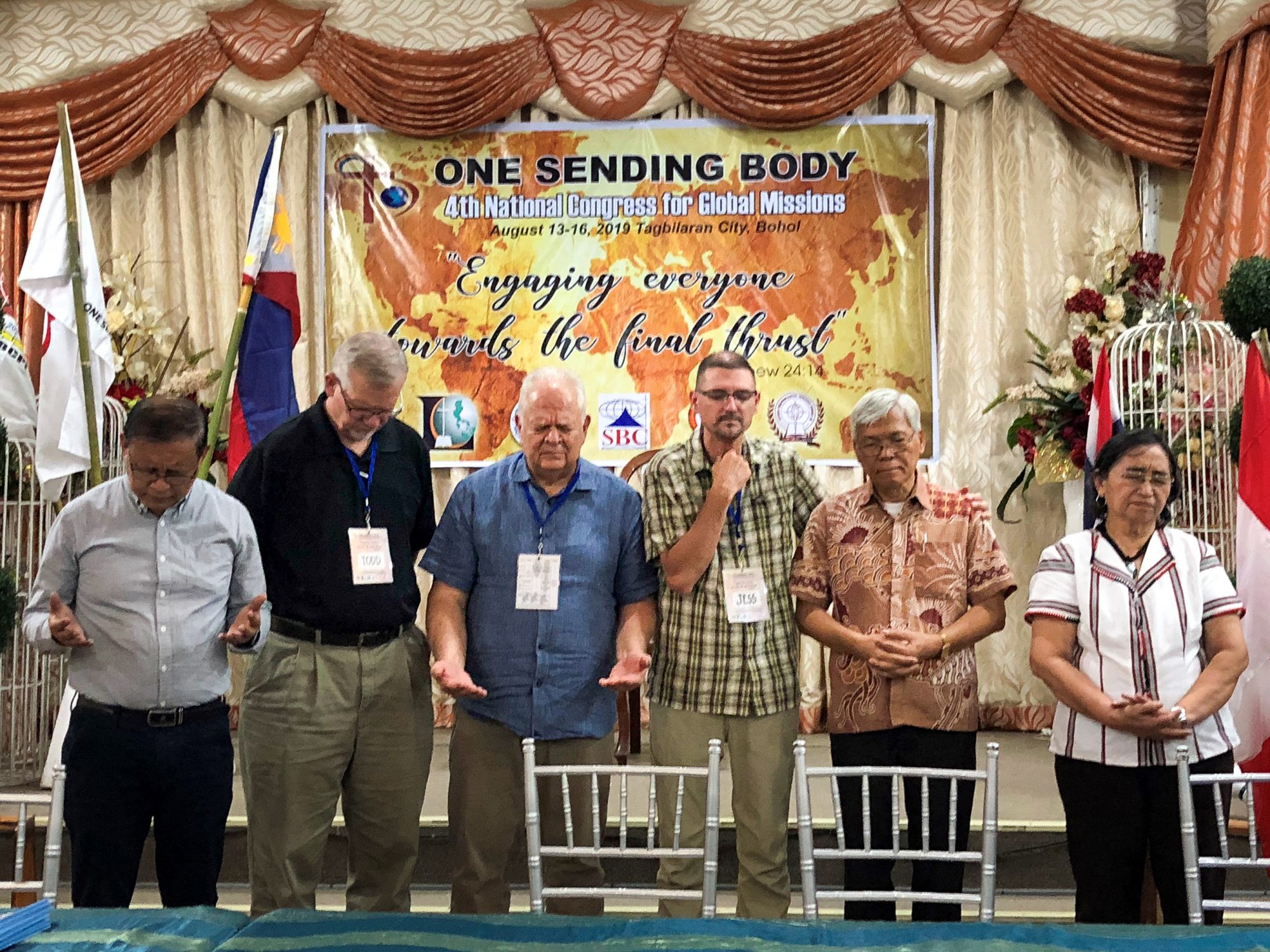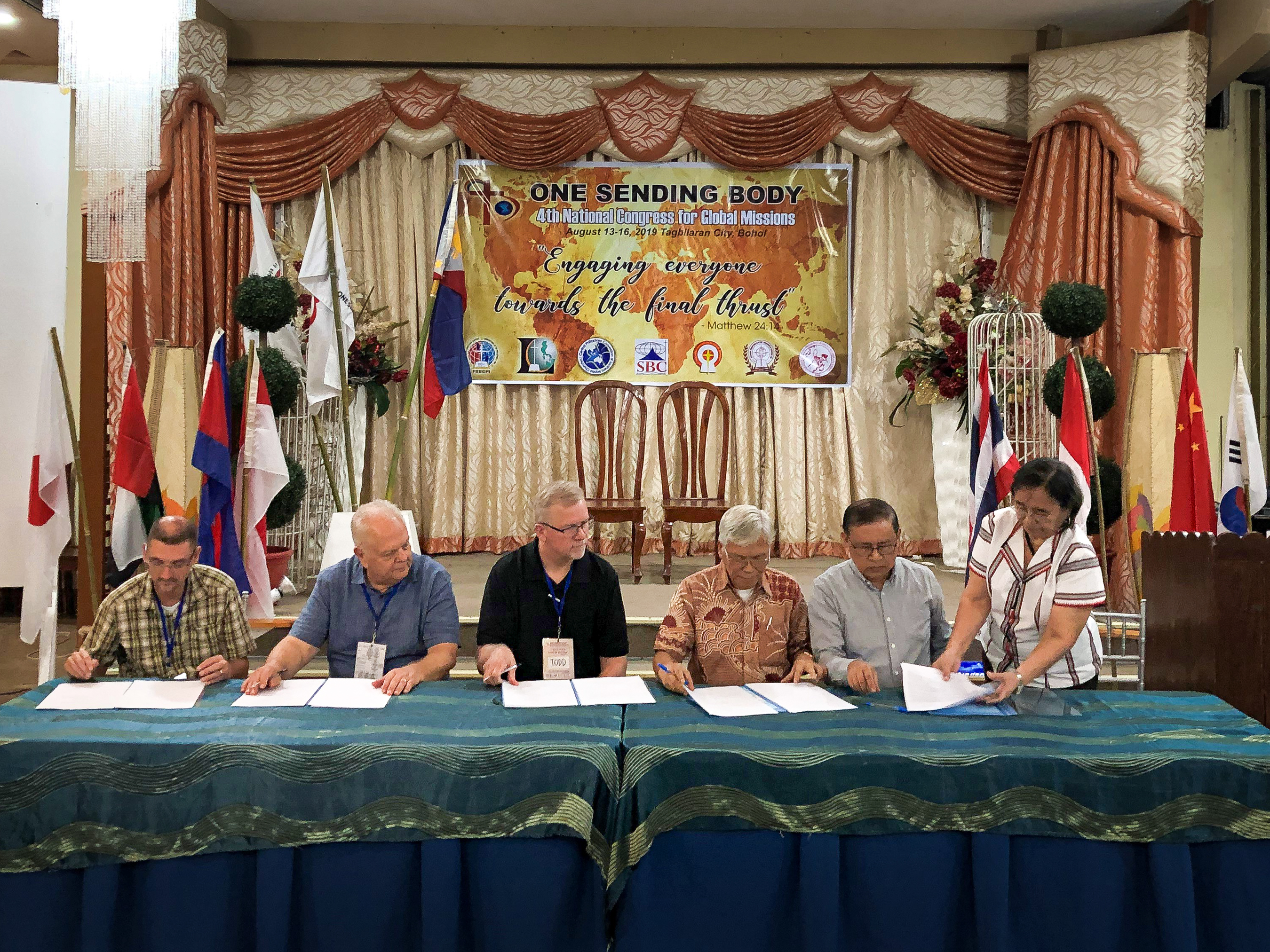BOHOL, Philippines—This August, the IMB signed a historic covenant with One Sending Body, the sending entity of the five Southern Baptist conventions in the Philippines. The agreement forges an official partnership between the two missionary-sending organizations and facilitates teaming between Filipino and IMB missionaries to advance the gospel.
The covenant was signed by IMB Executive Vice President Todd Lafferty and Vice President of Global Engagement John Brady during the Fourth National Congress for Global Missions, which took place from August 13 to 15 on the island of Bohol in the southern part of the Philippines.

IMB-OSB Prayer – John Brady, the IMB’s Vice President of Global Engagement, prays during the Fourth National Congress for Global Missions in the Philippines. At the congress, the IMB signed a partnership covenant with One Sending Body (OSB), the sending entity of the five Southern Baptist conventions in the Philippines. Pictured (L-R): Pastor James Fundar, OSB President; Todd Lafferty, IMB Executive Vice President; John Brady; Jess Jennings, IMB leader for the Philippines; Pastor Lino Caronongan, Chair of OSB; Precy Caronongan, OSB Secretary.
“Our vision is that we would strive together for the sake of the gospel to the ends of the earth,” Lafferty said of the agreement. “I hope to see dozens of Filipinos called to missions and partner with our teams to share the gospel, make disciples, plant churches, and train leaders.”
One Sending Body
Two hundred pastors and church leaders from the five Filipino Baptist conventions gathered at the congress. The Filipino conventions established One Sending Body in 2008, and IMB missionary Steve Hagen said that OSB currently has 21 missionaries serving in other countries.
“Some of these have done remarkably well. However, many have struggled, often because they were not connected to a receiving team,” Hagen said. “Sometimes they became frustrated by joining teams who didn’t share their beliefs. Sometimes they couldn’t find any partners and floundered.”
At OSB’s request, Hagen began consulting with their board of directors.
“As the relationship developed, I saw more and more potential for how God can use Filipinos around the world,” Hagen said.
“I saw more and more potential for how God can use Filipinos around the world.”
Hagen also heard from IMB colleagues who had pressing needs for more teammates to join them in the missions task. Hagen knew there must be a way to connect the OSB missionaries with the IMB teams who needed them. As it turns out, IMB leaders were pursuing partnerships just like this one.
Teaming and training together
Representatives from both organizations have acknowledged how their combined strengths can advance the gospel, and they are eager to work together in the new partnership.
Among the action points detailed in the covenant, Filipino missionaries will be commissioned to serve alongside IMB workers as seconded team members. IMB missionary teams are prepared to receive Filipino missionaries. The first missionary training program is scheduled for April 2020.

IMB-OSB Signing – IMB and One Sending Body leaders sign a covenant officializing a partnership between the two missionary-sending organizations. Pictured (L-R): Jess Jennings, IMB leader for the Philippines; John Brady, IMB Vice President of Global Engagement; Todd Lafferty, IMB Executive Vice President; Pastor Lino Caronongan, Chair of OSB; Pastor James Fundar, OSB President; Precy Caronongan, OSB Secretary.
IMB will partner with OSB in training the Filipino missionaries, but their funds will come from various other sources, including the five Filipino Baptist conventions. Some of the missionaries will raise or earn their own support. Southern Baptists in the United States will soon be able to help support our Filipino partners through special-gift funds.
The IMB is actively exploring how churches in the United States can be a part of the missions-sending process with OSB. Future U.S. church partnerships could include offering advice, coaching churches and pastors, or providing financial support in a manner that does not result in financial dependency.
Brentwood Baptist Church in Nashville, Tennessee, has already committed to partnering with OSB, and Brentwood’s missions pastor, Scott Harris, helped lead a session during the congress on how best to mobilize the local church.
Mobilizing the Filipino church
While there are many geographical areas and isolated people groups in the Philippines still in need of the gospel, there is also a thriving national church, Hagen said. He believes the Filipino churches are well-equipped to take on Scriptural challenges to share the gospel with those who’ve yet to hear it.
“There is great potential for the Philippines to be an influential sending nation,” Hagen said. “Not only is there a strong national church, Filipinos are incredibly adaptable and amiable; able to fit in and get along in situations where many cannot, with an unparalleled passion for serving others.
“Filipinos have the capacity to be a powerful force for sending to Southeast Asia and around the world.”
A good culture fit
Although the island nation is largely Catholic, IMB missionary Tyrel Kilkenny* said Filipinos share more similarities with evangelical Christians than Asians of other faiths like Buddhism, Hinduism or Islam do.
“Their indigenous manifestation of Christianity is more similar culturally to the West in many ways and enables them to relate more easily to Western team members, but they also have an underlying worldview that can [help them] understand and relate more easily than Westerners to the cultures they seek to reach,” Kilkenny said.
Kilkenny said Filipinos have multiple cultural influences that have influenced their country, and this positions them to be excellent cross-cultural witnesses.
“They are clearly Asian and therefore relate naturally to other Asians, but their culture has over 300 years of Spanish influence with a heavy dose of America as well,” Kilkenny said. “This makes it more natural for them to adapt and relate to both Western and Eastern cultures. Their Asian features enable them to blend in more easily in multiple cultures.”
“There is great potential for the Philippines to be an influential sending nation.”
Filipinos’ high proficiency in English – one of the nation’s official languages – enables them to communicate with a broad spectrum of people, especially since English is considered a default language in many countries. Filipinos grow up in multi-lingual environments and learn multiple languages. It’s estimated there are somewhere between 120 to 187 languages in the Philippines.
“While it doesn’t make it easy, it is a more natural expectation [for Filipinos] that other languages can and need to be learned,” Kilkenny said.
A Filipino future
Pastor Jimmy Fundar, President of OSB, led a session at the congress on missions history and the current challenges facing the OSB and Baptists globally. Fundar and his co-leaders in the session, Jess Jennings and Hagen, both IMB leaders in Asia, believe missions history is on the cusp of greatness, and they are confident the Lord will use Filipinos to advance the gospel.
Attendees at the congress also participated in a prayer-walking experience led by IMB missionary Nita Kilkenny.* Our Filipino brothers and sisters wept over those who have yet to receive the gospel.
Shane Saludez, an OSB missionary in Thailand, Brady, and Lafferty led evening sessions at the congress. On the last evening, six young adults made commitments to serve in unreached areas. One woman is already participating in her first trip to an unengaged, unreached people group in the Philippines with IMB personnel in preparation for longer overseas service.
“We believe God is going to use Filipinos and this partnership in mighty ways, for his glory,” Hagen said.
* Name changed

